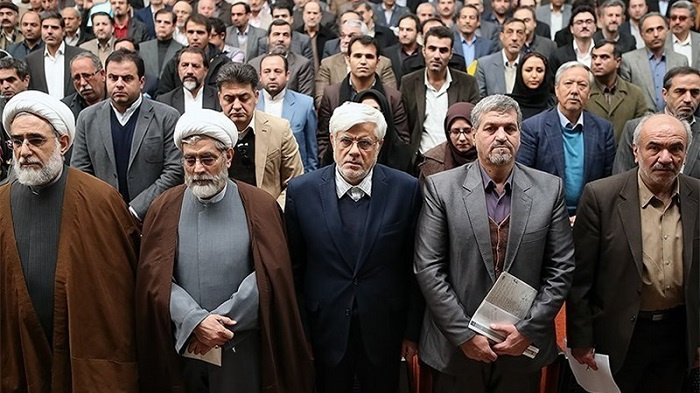Iran’s Reformists Are Rethinking the Benefits of Coalition with Moderates

“It was predictable that some members of the Hope Bloc would split ways with us but we did not see it coming that they would stand against us in the parliament”. These sardonic remarks come from Mohammadreza Aref, leader of the Reformist bloc, a year and half after the Tenth Parliament started work. He says he has more to say but prefers to keep them to himself to maintain solidarity among the Reformists.
After implicitly criticizing controversies within and without the party, the reticent leader has declared the end of the Reformist coalition. “The Reformist will not issue a coalition list in the 2019 election,” he said. Note Aref’s position as the head of the Supreme Reformist Policy-Making Council (SRPC) and the leader of the Reformist bloc.
Betrayal is not the only concern in the Reformist camp. The main concern, which has set the camp ablaze, is the “Reformist camouflage”: emergence of politicians who take photos with the Reformists and cast their votes into the rivals’ box, in the words of another well-known Reformist, Mostafa Kavakebian.
The widely-criticized phenomenon first appeared in 2015, when the Reformists brokered a coalition with administration advocates, the so-called ‘moderates’, leading to a joint shortlist for the parliamentary election. Immediately after tickets to the Parliament were issued, some split ways, with the rift deepening every day. Betrayers discussed today are those who entered the parliament under Reformist colors but acted to the interests of conservatives in no time after arrival.
That is why other Reformists believe Aref is right, even though they say his remarks on non-coalition are personal views expressed and it is too early to decide for an election that comes two years from now. One such pro-reform figure is Mohammad Atrianfar. “Those who win chairs in an election by relying on a political discourse should remain faithful to its organizational conducts, and bring up their issues in an organized, convergent manner,” he said in an interview with Khabar Online.
Rumors of Reform in Reformist camp
The outcome of the past coalitions and prediction of the future have put the Reformist in a dilemma in which they will have to choose between coalition and non-coalition.
The first obstacle is lack of clarity about the campaigns in the 2019 parliamentary elections. Member of the Supreme Reformist Policy-Making Council, Mohsen Rohami, blames all these doubts on the lawmakers who switched alliances. Although he believes that decision should be made based on circumstances and it is too early for a final decision, he advocates reform in the Reformist shortlist. “In 2013, we made a coalition with the moderates and Mr. Rouhani. We repeated that in 2015 and we do not have any regrets. However, the process has certain weaknesses that need to be eliminated,” Rohami told Khabar Online.
Neo-reformism or a new beginning
The tactical shifts in 2013 and 2015 helped the Reformist camp to achieve landslide victories, winning presidency and a majority in the parliament. However, the downsides of the coalition began to emerge in less than a year since the Parliament was sworn in and members from the joint list split ways from ‘Reformist proper’. Reformist figure Abbas Abdi sees this as proof that a single tactic cannot work every time. He also considers lack of innovation among pro-reform parties an additional problem. “The Principlists and Reformists are both in imbalanced political conditions. Some contradictions in their strategies, incongruous tactics, their time-bound executive policies prevent a clear perception of the appropriate conduct,” he wrote in an op-ed for Seda weekly recently. In his analysis of the pro-reform parties, he wrote they have failed to change their doctrines and strategies. “Reformists’ organizational structure and recruitment methods have not changed either. More interestingly, most members of their new parties are the same forces in preceding parties. The only thing that changes is the label,” he wrote.

